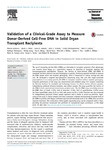Mostrar o rexistro simple do ítem
Validation of a clinical-grade assay to measure donor-derived cell-free DNA in solid organ transplant recipients
| dc.contributor.author | Grskovic, Marica | |
| dc.contributor.author | Hiller, David J. | |
| dc.contributor.author | Eubank, Lane A. | |
| dc.contributor.author | Sninsky, John J. | |
| dc.contributor.author | Christopherson, Cindy | |
| dc.contributor.author | Collins, John P. | |
| dc.contributor.author | Thompson, Kathryn | |
| dc.contributor.author | Song, Mindy | |
| dc.contributor.author | Wang, Yue S. | |
| dc.contributor.author | Ross, David | |
| dc.contributor.author | Nelles, Mitchell J. | |
| dc.contributor.author | Yee, James P. | |
| dc.contributor.author | Wilber, Judith C. | |
| dc.contributor.author | Crespo-Leiro, María Generosa | |
| dc.contributor.author | Scott, Susan L. | |
| dc.contributor.author | Woodward, Robert N. | |
| dc.date.accessioned | 2017-05-02T08:52:09Z | |
| dc.date.available | 2017-05-02T08:52:09Z | |
| dc.date.issued | 2016-10-07 | |
| dc.identifier.citation | Grskovic M, Hiller DJ, Eubank LA, et al. Validation of a clinical-grade assay to measure donor-derived cell-free DNA in solid organ transplant recipients. J Mol Diag. 2016;18(6):890-902 | es_ES |
| dc.identifier.issn | 1525-1578 | |
| dc.identifier.issn | 1943-7811 | |
| dc.identifier.uri | http://hdl.handle.net/2183/18466 | |
| dc.description.abstract | [Abstract] The use of circulating cell-free DNA (cfDNA) as a biomarker in transplant recipients offers advantages over invasive tissue biopsy as a quantitative measure for detection of transplant rejection and immunosuppression optimization. However, the fraction of donor-derived cfDNA (dd-cfDNA) in transplant recipient plasma is low and challenging to quantify. Previously reported methods to measure dd-cfDNA require donor and recipient genotyping, which is impractical in clinical settings and adds cost. We developed a targeted next-generation sequencing assay that uses 266 single-nucleotide polymorphisms to accurately quantify dd-cfDNA in transplant recipients without separate genotyping. Analytical performance of the assay was characterized and validated using 1117 samples comprising the National Institute for Standards and Technology Genome in a Bottle human reference genome, independently validated reference materials, and clinical samples. The assay quantifies the fraction of dd-cfDNA in both unrelated and related donor-recipient pairs. The dd-cfDNA assay can reliably measure dd-cfDNA (limit of blank, 0.10%; limit of detection, 0.16%; limit of quantification, 0.20%) across the linear quantifiable range (0.2% to 16%) with across-run CVs of 6.8%. Precision was also evaluated for independently processed clinical sample replicates and is similar to across-run precision. Application of the assay to clinical samples from heart transplant recipients demonstrated increased levels of dd-cfDNA in patients with biopsy-confirmed rejection and decreased levels of dd-cfDNA after successful rejection treatment. This noninvasive clinical-grade sequencing assay can be completed within 3 days, providing the practical turnaround time preferred for transplanted organ surveillance. | es_ES |
| dc.language.iso | eng | es_ES |
| dc.publisher | Elsevier para American Society for Investigative Pathology and the Association for Molecular Pathology | es_ES |
| dc.relation.uri | https://doi.org/10.1016/j.jmoldx.2016.07.003 | es_ES |
| dc.rights | Atribución-NoComercial-SinDerivadas 3.0 España | es_ES |
| dc.rights.uri | http://creativecommons.org/licenses/by-nc-nd/3.0/es/ | * |
| dc.title | Validation of a clinical-grade assay to measure donor-derived cell-free DNA in solid organ transplant recipients | es_ES |
| dc.type | info:eu-repo/semantics/article | es_ES |
| dc.rights.access | info:eu-repo/semantics/openAccess | es_ES |
| UDC.journalTitle | The Journal of Molecualr Diagnostics | es_ES |
| UDC.volume | 18 | es_ES |
| UDC.issue | 6 | es_ES |
| UDC.startPage | 890 | es_ES |
| UDC.endPage | 902 | es_ES |
Ficheiros no ítem
Este ítem aparece na(s) seguinte(s) colección(s)
-
INIBIC-ICATC - Artigos [156]






